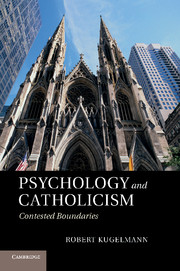Book contents
- Frontmatter
- Contents
- Acknowledgments
- 1 An introduction
- 2 The major fault line: modernism and psychology
- 3 Neoscholastic psychology
- 4 Psychology as the boundary: Catholicism, spiritualism, and science
- 5 Psychoanalysis versus the power of will
- 6 From out of the depths: Carl Jung's challenges and Catholic replies
- 7 Institutionalizing the relationship
- 8 Humanistic psychology and Catholicism: dialogue and confrontation
- 9 Trading zones between psychology and Catholicism
- 10 Crossings
- References
- Index
6 - From out of the depths: Carl Jung's challenges and Catholic replies
Published online by Cambridge University Press: 05 July 2011
- Frontmatter
- Contents
- Acknowledgments
- 1 An introduction
- 2 The major fault line: modernism and psychology
- 3 Neoscholastic psychology
- 4 Psychology as the boundary: Catholicism, spiritualism, and science
- 5 Psychoanalysis versus the power of will
- 6 From out of the depths: Carl Jung's challenges and Catholic replies
- 7 Institutionalizing the relationship
- 8 Humanistic psychology and Catholicism: dialogue and confrontation
- 9 Trading zones between psychology and Catholicism
- 10 Crossings
- References
- Index
Summary
We could reappraise Jung's life-long effort to reinterpret, not so much science, philosophy, society, or even psychiatry, but theology.
James Hillman (1975, p. 228)Forty years ago, one could speak confidently about ours being a secularizing age: the more science and technology progressed, the more religion receded (Cox, 1965). Carl G. Jung could write about “modern man in search of a soul” (1933) because secularization meant that religious symbols, rituals, and beliefs lost their meaning for an ever increasing number. There were for the first time in history entire nations, especially the Soviet Union, dedicated to atheism. The Positivist dream was being fulfilled.
But it has not happened that secularization simply progressed. The public sphere became increasingly areligious, but this remains highly contested ground. If much of Western Europe seems contentedly secular, in the United States, as in many nations in the east and the south, intense religious ferment explodes on the cultural and political stages. Religious and spiritual issues, once on the fringe of mainstream psychology, as represented by the American Psychological Association, have come front and center. Even biomedicine, that bulwark of secularized views of the body and illness, acknowledges more readily the spiritual and religious dimensions of medicine and their usefulness in preserving health and fighting illness. One cannot speak of desecularization, however, for secularization proceeds apace.
- Type
- Chapter
- Information
- Psychology and CatholicismContested Boundaries, pp. 203 - 260Publisher: Cambridge University PressPrint publication year: 2011



